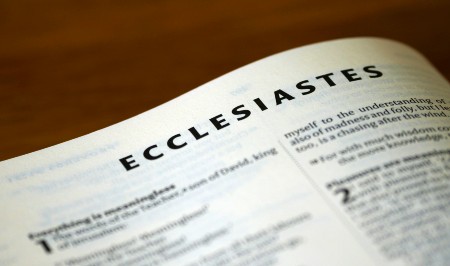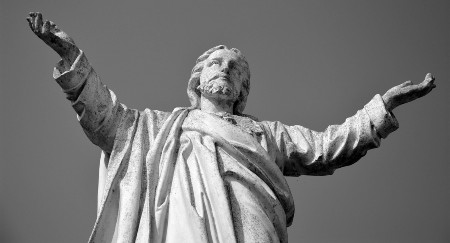 Hi readers, it seems you use Catholic Online a lot; that's great! It's a little awkward to ask, but we need your help. If you have already donated, we sincerely thank you. We're not salespeople, but we depend on donations averaging $14.76 and fewer than 1% of readers give. If you donate just $5.00, the price of your coffee, Catholic Online School could keep thriving. Thank you. Help Now >
Hi readers, it seems you use Catholic Online a lot; that's great! It's a little awkward to ask, but we need your help. If you have already donated, we sincerely thank you. We're not salespeople, but we depend on donations averaging $14.76 and fewer than 1% of readers give. If you donate just $5.00, the price of your coffee, Catholic Online School could keep thriving. Thank you. Help Now >
May We Be Counted as Oxes and Asses before Jesus
Therefore the Christmas crčche and the ox and the ass are intended to unsettle us: "In this night, then, the faces of the ox and the ass look at us with a question: My people does not understand, but do you perceive the voice of your Lord?"
Highlights
Catholic Online (https://www.catholic.org)
12/26/2013 (1 decade ago)
Published in Living Faith
Keywords: Christmas, creche, St. Francis, Ratzinger, ox, ass, Andrew M. Greenwell
CORPUS CHRISTI, TX (Catholic Online) - In all Christmas manger scenes, it is de rigeur to include an ox and an ass. The custom of the Christmas crčche or Nativity Scene is attributed to St. Francis of Assisi who, as his biographer Thomas of Celano stated, loved Christmas which he considered "the feast for feasts, for on this day God become a little child . . . ."
It was at the small town of Greccio in the Rieti Valley in Umbria where St. Francis desired to make Bethlehem present. As Cardinal Ratzinger put it in a reflection on Christmas, St. Francis desired the town of Greccio to "become his Bethlehem, and it inscribed the mystery of Bethlehem anew in the geography of souls."
Cardinal Ratzinger describes the impetus behind St. Francis's invention which is so marvelously portrayed in Giotto's fresco "The Christmas Feast at Greccio."
"It is in the child Jesus that we see most clearly the defenselessness of God's love. God comes without weapons, because he does not want to conquer from the outside but to win us over from within and to transform us from within. If anything can conquer the arrogance, the violence, and the greed of man, it is the utter vulnerability of a child . . . ."
We must become as children--we must become vulnerable ourselves to the vulnerable God. "One who has not accepted this," Cardinal Ratzinger concludes, "cannot enter the kingdom of heaven--and this is what Francis wished to recall anew to the Christians of his own day and of very succeeding generation."
St. Francis gave specific instructions that the crčche include an ox and an ass. "I wish in full reality to awaken the remembrance of the child as he was born in Bethlehem . . . . I wish to see with my bodily eyes what it meant to lie in a manger and sleep on hay, between an ox and an ass."
Yet the ox and the ass show up nowhere in our Gospel narratives. From where does it come?
The great theologian Origen of Alexandria is generally believed to have been the first to put the ox and the ass into the Christmas mise-en-scčne. It was he who, in a homily on the Gospel of Luke (Homily XIII.7), tied together Luke 2:13-16 with the Septuagint version of Isaiah 1:3 by their common use of the Greek word for manger (φατνη or phantē).
Jesus was placed in a manger the Gospel of Luke states, and then Origen amplifies: "That was the manger of which the inspired prophet said, 'The ox knows his owner and the ass his master's manger.'"
In his homily, Origen is referring to Isaiah 1:3:
The ox knows its owner,
and the donkey its master's crib;
but Israel does not know,
my people do not understand.
The presence of the ox and the ass allowed for great exposition. They symbolized the Jew and the Gentile, who would be united alike by their hunger for Christ. The ox was a clean animal under Jewish law, whereas the ass was not. This made the ox a fitting type for Jewry and the ass a fitting type for the Gentile nations.
It was the one Lord, one faith, and one baptism (Eph. 4:5) that was found in the form of a Child in a manger that would unite the Jew and the Gentile. Origen again recruited Isaiah: "Happy will you be who sow beside every stream, who let the ox and the ass range freely." (Is. 33:20) It was the waters of baptism--the stream of water--which would give to both the ox and the ass the freedom of the sons of God. (Cf. Rom. 8:21).
In one of his sermons (Sermon 159) St. Peter Chrysologous elaborates on Origen's insight. "The Christ-King," St. Peter says, "is set before those two prophetic beasts that stood as the type and figure of the two peoples they behold and admire and know. For 'the Ox knows his owner, and the Ass his master's crib.' The Jewish Ox shaking off the yoke of the law knew; and the Gentile Ass laying aside its wild stupidity knew also: the Jewish Ox by deserting the superfluous labor of observance; the Gentile Ass by relinquishing the roving error of superstition."
We want to be counted among them. "Each of them knows," concludes St. Peter, "for each of them approaches to the one manger of the Lord that he may be fed; fed, not with the hay of death, but with the food of salvation. Eat, eat, you holy animals, the foods of life eternal: busy your hungry jaws as you may with the pabulum of everlasting retribution; not dispersing it aimlessly but taking it sold and entire."
So it is we who are the oxes and asses in the manger scene, "since we are but oxen and asses vis-ŕ-vis the Eternal God," observed Cardinal Ratzinger, "oxen and asses whose eyes are opened on Christmas night, so that they can recognize their Lord in the crib."
But are our eyes open? Are we in fact oxes or asses, or are we among the people who do not understand, and so are not found in the manger scene?
The Christ in the manger and the presence of the ox and the ass as are challenges, as Cardinal Ratzinger reminds us. Are we oxes or asses present before the Lord, or are there things--sins, beliefs, hatreds, bitterness--we harbor that separate us from the Christ Child and so take the manger away from the "geography of our souls"?
Do we really recognize Jesus for who he is? "When we place the ox and ass beside the crib, we must remember the whole passage in Isaiah," Cardinal Ratzinger says, "which is not only good news--in the sense of the promise of future knowledge--but also a judgment pronounced on contemporary blindness. The ox and ass have knowledge, 'but Israel does not know, my people does not understand.'"
Therefore the Christmas crčche and the ox and the ass are intended to unsettle us: "In this night, then, the faces of the ox and the ass look at us with a question: My people does not understand, but do you perceive the voice of your Lord?"
This Christmas, do you perceive the voice of your Lord?
"Let us understand this manger," said Origen to his flock. "Let us endeavor to recognize the Lord and to be worthy of knowing him, and of taking on not only his birth and the resurrection of his flesh, but also his celebrated second coming in majesty, to whom is glory and power for ages of ages. Amen."
May Bethlehem be in our souls.
May the Christ Child be in the manger of our hearts.
May we be found among the asses and the oxes in the stable.
May we perceive the voice of our Lord.
May the Christ Child bless all of you this Christmas Day.
-----
Andrew M. Greenwell is an attorney licensed to practice law in Texas, practicing in Corpus Christi, Texas. He is married with three children. He maintains a blog entirely devoted to the natural law called Lex Christianorum. You can contact Andrew at agreenwell@harris-greenwell.com.
---
'Help Give every Student and Teacher FREE resources for a world-class Moral Catholic Education'
Copyright 2021 - Distributed by Catholic Online
Join the Movement
When you sign up below, you don't just join an email list - you're joining an entire movement for Free world class Catholic education.
-

-
Mysteries of the Rosary
-
St. Faustina Kowalska
-
Litany of the Blessed Virgin Mary
-
Saint of the Day for Wednesday, Oct 4th, 2023
-
Popular Saints
-
St. Francis of Assisi
-
Bible
-
Female / Women Saints
-
7 Morning Prayers you need to get your day started with God
-
Litany of the Blessed Virgin Mary
Giants of the Fallen: Unveiling the Mystery of the Nephilim from a Catholic Perspective
-

Ancient Wisdom, Modern Choices: How Ecclesiastes 10:2 Illuminates Today's Political Divide
-

How Do We Know Truth? A Catholic Perspective
-
Veterans Day: Prayer for all veterans to find peace and healing
-
The Power of the Rosary: Why Praying the Rosary Matters for Catholics
Daily Catholic
 Daily Readings for Friday, November 15, 2024
Daily Readings for Friday, November 15, 2024 St. Albert the Great: Saint of the Day for Friday, November 15, 2024
St. Albert the Great: Saint of the Day for Friday, November 15, 2024 To the Holy Spirit: Prayer of the Day for Friday, November 15, 2024
To the Holy Spirit: Prayer of the Day for Friday, November 15, 2024- Daily Readings for Thursday, November 14, 2024
- St. Lawrence O'Toole: Saint of the Day for Thursday, November 14, 2024
- Prayer for Our Enemies: Prayer of the Day for Thursday, November 14, 2024
![]()
Copyright 2024 Catholic Online. All materials contained on this site, whether written, audible or visual are the exclusive property of Catholic Online and are protected under U.S. and International copyright laws, © Copyright 2024 Catholic Online. Any unauthorized use, without prior written consent of Catholic Online is strictly forbidden and prohibited.
Catholic Online is a Project of Your Catholic Voice Foundation, a Not-for-Profit Corporation. Your Catholic Voice Foundation has been granted a recognition of tax exemption under Section 501(c)(3) of the Internal Revenue Code. Federal Tax Identification Number: 81-0596847. Your gift is tax-deductible as allowed by law.








 Daily Readings for Friday, November 15, 2024
Daily Readings for Friday, November 15, 2024 St. Albert the Great: Saint of the Day for Friday, November 15, 2024
St. Albert the Great: Saint of the Day for Friday, November 15, 2024 To the Holy Spirit: Prayer of the Day for Friday, November 15, 2024
To the Holy Spirit: Prayer of the Day for Friday, November 15, 2024

